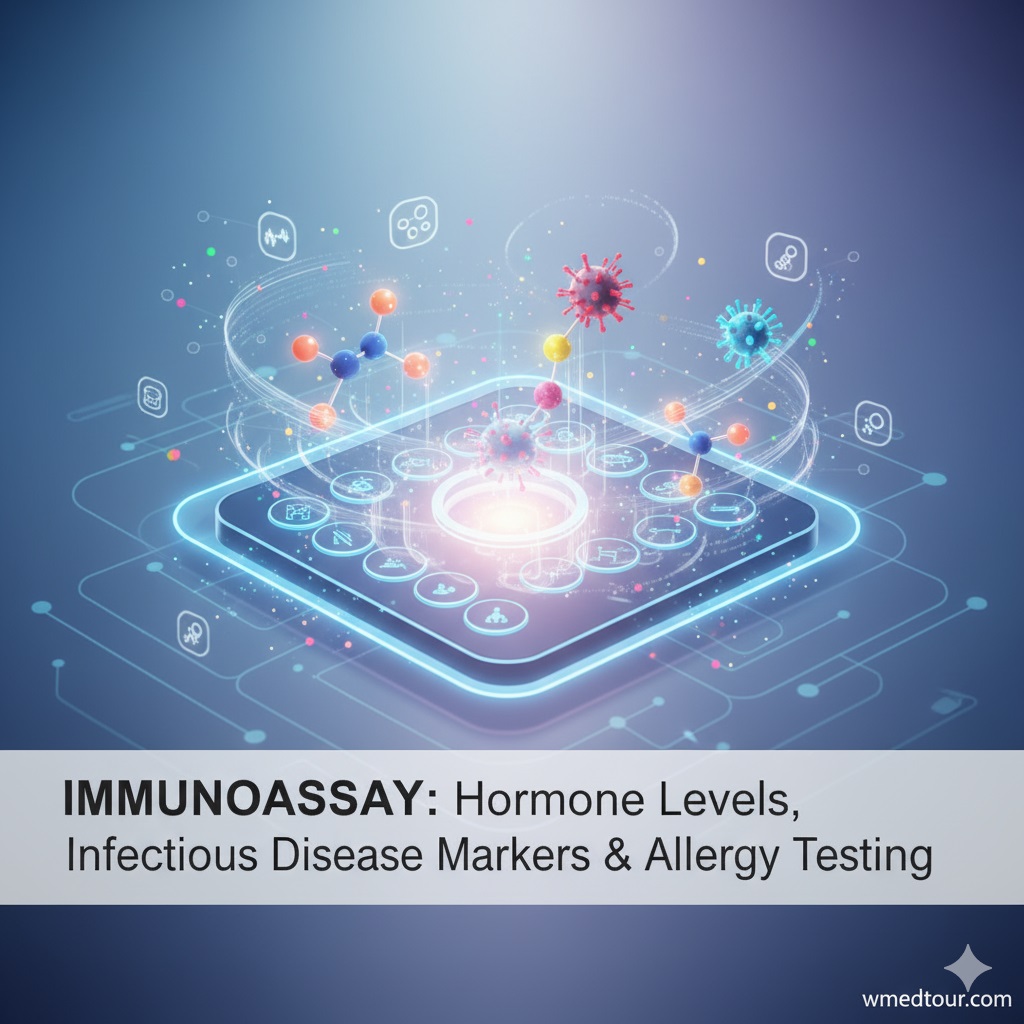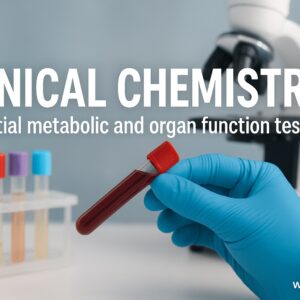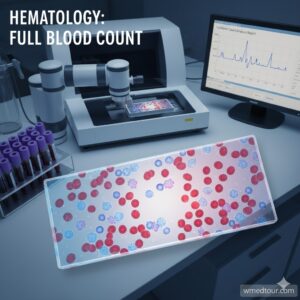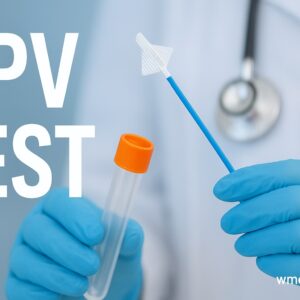Description
Immunoassay: Hormone levels, infectious disease markers, and allergy testing: A 2025 Guide 🧪
Executive Summary: Precise Diagnostics for Invisible Triggers
Immunoassay is a cornerstone of laboratory diagnostics. To clarify, this sensitive method detects and measures specific substances—or analytes—in the blood. Therefore, it is invaluable for managing many conditions. Indeed, the technique is fundamental to diagnosing issues ranging from thyroid dysfunction to viral infections. Understanding the power of Immunoassay: Hormone levels, infectious disease markers, and allergy testing is key to modern, personalized medicine.
- Hormone Balance: Immunoassays accurately monitor fertility, thyroid, and metabolic health, providing data critical for treatments like PGT-A testing.
- Infectious Disease: They rapidly identify antibodies or antigens for viruses like HIV, Hepatitis, and COVID-19, enabling swift public health response.
- Allergy & Autoimmunity: Furthermore, these tests quantify specific IgE antibodies, pinpointing exact allergens to guide treatment.
1. The Science of Immunoassay: How it Works 🔬
An immunoassay uses the highly specific binding between an antibody and an antigen. In essence, it finds a target molecule by using a known “detector” molecule. Most modern systems utilize chemiluminescence or fluorescence to produce a measurable signal. Consequently, this precise method provides incredibly accurate quantification of analytes, even at minute concentrations. Generally, labs use automated immunoassay platforms for high-volume, reliable testing.
Specifically, the clinical scope of Immunoassay: Hormone levels, infectious disease markers, and allergy testing spans several key medical departments. This is why it forms a critical part of a comprehensive Health Checkup 2025.
2. Hormonal Health: Immunoassay for Endocrine Balance 📈
Hormones regulate nearly every bodily function. Thus, imbalances can cause major health issues. Immunoassay is the gold standard for measuring these tiny messengers. For example, thyroid hormones (TSH, T3, T4), sex hormones (Estrogen, Testosterone), and fertility markers (FSH, LH) are all quantified using this technique.
Fertility and Reproductive Endocrinology
Indeed, fertility clinics rely heavily on immunoassay to optimize treatment. Accurate measurement of ovarian reserve markers, such as AMH (Anti-Müllerian Hormone), is paramount for planning cycles of IVF treatment. Moreover, these tests help identify hormonal factors contributing to infertility, guiding couples through complex journeys. For this reason, reviewing the Fertility Treatments Checklist is vital before seeking care abroad.
3. Detecting Infectious Diseases and Immune Responses 🦠
Immunoassays are rapid and essential tools for infectious disease surveillance and diagnosis. They quickly detect either antigens (the invader itself) or antibodies (the body’s response). Consequently, this duality makes them flexible diagnostics.
Comparison Table: Test Type vs. Target
| Immunoassay Test | Analyte Target | Clinical Application |
|---|---|---|
| Antigen Test (e.g., HIV p24) | The pathogen (virus/bacteria) | Early, acute infection detection. |
| Antibody Test (e.g., IgG/IgM) | The immune system’s response | Determining past exposure or long-term immunity. |
Newer high-sensitivity platforms are detecting disease markers earlier than ever. Furthermore, these advancements are crucial in oncology, where infectious disease can complicate treatments like TCR T-Cell Receptor Therapy. Therefore, rapid, accurate detection is crucial for patient safety.
4. Pinpointing Allergies: IgE and Specificity 🤧
Allergy testing using immunoassay focuses on detecting specific IgE antibodies in the blood. To illustrate, when a person encounters an allergen, the body produces IgE. However, the blood-based immunoassay is safer than skin-prick tests, which carry a small risk of severe reaction. This method—part of a comprehensive Immunoassay: Hormone levels, infectious disease markers, and allergy testing panel—measures the IgE response to hundreds of specific substances, including foods, pollens, and animal dander.
Pros and Cons of Immunoassay Technology
- Pros: High Sensitivity and Automation allow for rapid, accurate, and high-volume testing, ensuring quick turnaround times. Moreover, the use of serum makes it a **non-invasive** alternative to skin tests for allergy diagnosis.
- Cons: Cost and Cross-Reactivity can be factors. Specifically, high-end automated systems require a substantial investment, limiting access in some regions. Also, cross-reactivity between related molecules can sometimes lead to false positive results.
Case Study: Diagnostics for Medical Travel Preparation 🌍
Ms. Lena, a patient planning a medical journey for aesthetic procedures highlighted in the Aesthetic in Dubai Guide, required pre-travel screening. Consequently, her WMedTour physician ordered a full panel of Immunoassay: Hormone levels, infectious disease markers, and allergy testing.
- The Test: Hormone levels, including TSH and Estradiol, were checked to ensure endocrine stability before surgery.
- The Finding: Her TSH was mildly elevated, indicating subclinical hypothyroidism. Although this was subtle, it needed attention. Furthermore, a Hepatitis B antibody immunoassay showed insufficient immunity.
- The Action: The physician initiated a small dosage of thyroid medication immediately and ordered a booster vaccination for Hepatitis B. Ultimately, this pre-screening ensured Ms. Lena’s health was optimized before travel. Her care coordinator used the Surgeon Clinic Checklist to confirm the destination clinic was ready. **Thus**, her successful journey to Turkey was secured by proactive diagnostics and preparation, as detailed in guides like the Medical Tourism Turkey Ultimate Guide.
The Future: Digital Immunoassay and Multiplexing 🚀
The field is moving towards digital and multiplex Immunoassay: Hormone levels, infectious disease markers, and allergy testing. Digital assays count individual molecules, providing unprecedented sensitivity. In addition, multiplexing allows a single blood sample to be tested simultaneously for dozens of analytes, accelerating diagnosis. This innovation is transforming how we approach complex diagnoses, similar to the multi-target approach in diagnostics for early cancer signs, often related to discussions around Pediatric Cancer Early Signs.
We ensure our global network of partner laboratories employs the latest immunoassay technology. Therefore, you receive trusted, accurate, and timely diagnostic information, no matter your location.










Reviews
There are no reviews yet.